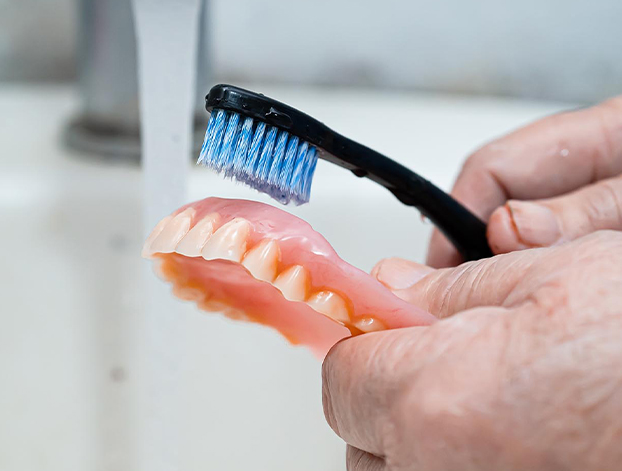Solutions for Common Denture Problems

Expert Denture Care Solutions
Dentures have become increasingly comfortable and beneficial in recent years, but some common issues can still arise for wearers. By maintaining proper denture care and following a healthy diet, you can keep your gums and mouth in good condition and prevent irritation or infections.
If you're experiencing any problems with your dentures, the team at Cedar Grove Dental Group in Cedar Grove is here to help. We offer solutions and advice to address common denture issues. Contact us at (973) 857-0567 to find out more about our services or to book an appointment.
What to Expect With Dentures
Getting dentures for the first time will result in significant lifestyle changes. Denture wearers should expect dietary adjustments and initial discomfort. These appliances are not as efficient at chewing as natural teeth and can cover the palate, affecting the sensation of flavors. As a result, many denture wearers tend to prefer more processed foods, which are often higher in fat, salt, and sugar. We recommend a diet rich in protein, carbohydrates, and healthy fats for denture wearers.
It is normal to experience soreness and discomfort when wearing dentures for the first time. The University of Iowa's College of Dentistry and Dental Clinics states that it is not uncommon for dentures to require relining or remaking within six to eight weeks after tooth extraction. This adjustment period allows the mouth muscles to adapt to the appliance. As wearers become accustomed to their dentures, any initial pain and discomfort will subside, allowing them to comfortably resume their normal activities.
“Getting dentures for the first time will result in large lifestyle changes.”
Seeking assistance when problems arise
It is crucial to promptly seek treatment when issues with dentures arise. Common problems include gum and mouth irritation, loose dentures, and mouth infections. Ensuring that dentures fit correctly can significantly increase comfort and reduce soreness.
If experiencing any denture-related problem, contact our team promptly. The dentures may require adjustment or replacement. Denture wearers who neglect ill-fitting dentures may develop mouth infections such as cheilitis and stomatitis. Seeking medical attention at the onset of an issue can prevent such complications.
“Seeking treatment promptly is essential when issues with dentures occur.”
Taking Care of Dentures While Traveling
People can still enjoy traveling with dentures, but it's essential to maintain a regular cleaning routine. Denture wearers should pack a small case containing denture care essentials, including a covered storage container.
Cleanser creams, gels, and pastes can be taken along as long as they comply with airline size requirements for liquids. It's also crucial to uphold proper denture care practices while traveling. This includes removing and rinsing dentures after every meal, brushing them daily, and soaking them overnight.
“Seeking treatment promptly is essential when issues with dentures occur.”
Precautions With Food
When wearing new dentures, it is important to eat soft foods and take small bites. Chew slowly and try to evenly distribute the food on both sides of the mouth to help the jaw muscles adjust. Some people may choose to use denture adhesive for added stability. It is best to avoid hard, hot, tough, or sticky foods to prevent potential damage to the dentures.
Initially, hot foods should be avoided as the lower temperature sensitivity can increase the risk of accidental burns. Once patients become accustomed to their dentures, they can gradually reintroduce hot foods into their diet. Foods like hard vegetables, seeds, nuts, chewing gum, and sticky foods should also be avoided as they can damage dentures and make cleaning more difficult.
"It is recommended to consume soft foods and take small bites when wearing new dentures."
Screening for Oropharyngeal Cancer
Wearing ill-fitting dentures or not practicing good oral care while wearing them can increase the risk of oral cancer. Research shows that irritation, inflammation, and infection from poorly fitting dentures are associated with oral cancer development. However, there is no evidence linking the duration of denture use to cancer development.
To reduce the risk of oral cancer, individuals should have their dentures regularly checked for proper fit. Well-fitting dentures can help prevent infection and inflammation. It is also important for denture wearers to remove and clean their dentures every night.




